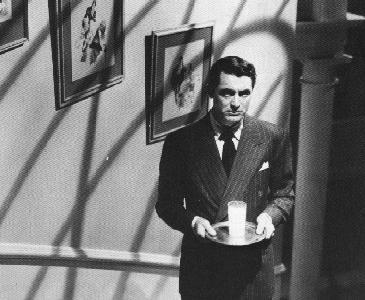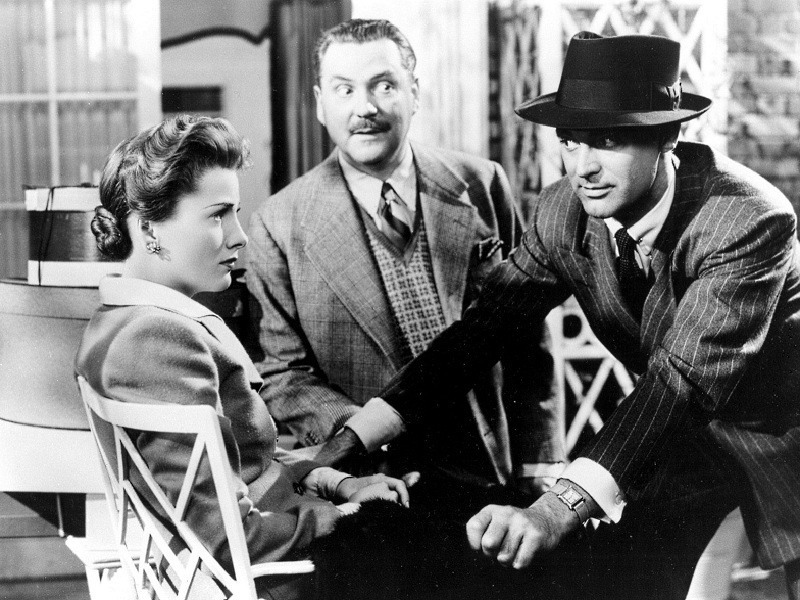 |
| The precursor to the ruffy-colada |
Alfred
Hitchcock has held the title of master of suspense amongst cinema buffs for
nearly seventy years. After directing over fifty films in both England and
America in a career that began in the silent era and lasted well after
Hollywood’s Golden Age had faded, he remains synonymous with thrills, chills,
and unforgettable twists. Unfortunately for Hitchcock, however, many of his
greatest works were considered ahead of their time due to their original themes
and adult content. As a result, some of the director’s best works were altered
and marred by the efforts of the studio system to make his unique visions fit
the established standards accepted by contemporary audiences and censors. One
such film is the 1941 thriller Suspicion,
a film that has been debated to be among both Hitchcock’s best and worst projects
due to its controversial, censor induced, ending.
The
story begins, like many Hitchcock films, with a whirlwind romance. In this case,
the couple in question is wealthy wallflower Lina McLaidlaw (Joan Fontaine) and
impoverished charmer Johnny Aysgarth (Cary Grant). Lina and Johnny briefly meet
when she helps him pay for a first class train ticket when he is caught
sneaking into her first class car after only paying for a coach ticket. The
two later meet again through mutual friends who cue Johnny in to Lina’s wealth
and class status and tell him that she’s ‘out of his league’. Despite or, even
more likely, because of their income and class differences, he proceeds to
relentlessly pursue her. While she resists his charms at first, she eventually
gives in and agrees to marry him because she is equally flattered by his
attentions and afraid of remaining single and being labeled a spinster. Upon
returning from their honeymoon, Lina is shocked to learn that Johnny is far
more destitute than she realized and that their house, furniture, and trip was
not actually paid for by Johnny, but by loans that he had taken from his friends. She
is horrified when she confronts him and he laughs off the matter, saying that
they should not have any trouble paying back the loans with her monthly income
from her parents’ trust. She grows increasingly disillusioned with him as time
goes on and he takes on a job at her urging, only to lose it after being caught
embezzling, and pursues a series of ‘business deals’ that are later discovered
to be attempts at obtaining quick cash through gambling. The situation finally
reaches a boiling point when Johnny convinces his gullible friend, Beaky (Nigel
Bruce), to finance a land development scheme that he has concocted, which Lina
suspects is really a clever con-job. After overhearing her begging Beaky to
decline his offer, Johnny angrily decides to call the entire deal off.
Before Beaky can dissolve his and Johnny’s corporation, however, Beaky is found
murdered in Paris and Lina discovers that Johnny has taken a substantial
life insurance policy out on her, leading her to suspect that there is
something sinister behind her husband’s easy charm.
SPOILER ALERT!!
While
films often diverge from the novels that they are based upon, Suspicion would have greatly benefited
had its studio-altered ending been replaced with the original ending in its
source novel, Before the Fact. Just
as in the film, in the novel Lina eventually comes to suspect that there is
more to Johnny than his playboy persona following Beaky’s death and her
discovery of Johnny’s secret insurance policy. In the novel, however, the plot
follows to its logical conclusion with Johnny poisoning his wife in an attempt
to collect insurance on her life. The twist in the novel, however, is that Lina
is already aware of her husband’s plan when he brings her a tampered drink, but
consumes it anyhow as a final act of devotion to ensure that he can collect the
insurance money and finally be rid of his many debts. While the ending in the
novel hinges on Lina’s preposterously extreme fixation on her husband’s happiness, the
final act of Johnny killing her is perfectly in line with the story’s preceding
action. In the film, however, the plot builds to Lina accepting the poisoned
drink, only to later realize that it was not poisoned after all and her
suspicions were in fact unfounded. Although Johnny’s innocence is an equally
intriguing twist that could have turned the film into an exploration of paranoia, there is nothing within the film’s plot that could lend
credibility to such a turn of events. Furthermore, Lina’s discovery that Johnny
was only researching untraceable poisons in an effort to commit suicide makes
little sense, as he could have killed himself in a number of more simple and
effective ways. Had Johnny taken the insurance policy out on himself the
interest in untraceable poison would have supported his innocence and proved that he wanted to use the information to conceal his suicide in order to ensure
that Lina could collect on his policy. This ending also leaves Beaky’s murder
without any resolution, making his death little more than a frustrating red herring
and a wasted use of an entertaining character.
 |
| Alfred Hitchcock: Reducing Grown Women to Toddlers Since 1941 |
Beyond
its jarring effect upon the film’s plot, Suspicion’s
ending also calls Johnny’s behavior into serious question. At the start their
relationship, he treats Lina with obvious condescension, mocking her lack of
romantic experience, insulting her personal style, and calling her by the
degrading nickname “monkeyface”. As their relationship continues his behavior
toward her continues to be callous as he sells her treasured family herilooms
without her consent, insists upon living off of her inheritance rather than
earn his own living, and continues to treat her like a child or simpleton each
time that she questions his actions. Johnny’s demeaning treatment of Lina would
make sense if he were strictly interested in her for her money, but becomes
baffling with the final revelation of his innocence and genuine love for her.
Similarly, the lies that he tells to the police following Beaky’s death become
illogical, as they only serve to hinder the police’s investigation into his
supposedly dear friend’s death and implicate him in the murder in the eyes of
his wife. Although the hasty resolution of Lina’s suspicions could be read as
her forcing herself to believe yet another of Johnny’s lies with him left free
to fulfill his plan once they arrive home, there is not enough evidence to
definitively support that theory. While the studio does share part of the blame
for the film’s anticlimax, Hitchcock was equally responsible for using the
illogical filmed ending instead of another proposed ending that would have
satisfied Hay’s Code regulations concerning criminals receiving punishment. In
the alternative ending, Lina would have drank the poison with full knowledge of
Johnny’s intents, but instead of letting herself die in an act of love she would
have also have arranged for Johnny to mail a letter to her mother that secretly
revealed Johnny’s plot to kill her. Although this version would have still
required Lina to die, she would have been doing so in an effort to serve
justice by ensuring Johnny’s capture rather than in a bizarre attempt to assist
his psychotic behavior. Had it been utilized, this ending would have served as
an effective climax that contained the trademark Hitchcock twist while still
appeasing censors.
END
SPOILER
Although
the script does contain a substantial let down, the film is saved by its
intriguing performances. Cary Grant takes his famous charm into a fascinating
direction in his portrayal of Johnny’s manic recklessness. In Grant’s hands,
Johnny is an effectively ambiguous character who could be easily viewed as
either an underestimated villain or misunderstood anti-hero. Joan Fontaine attempts
to turn in an engaging performance as Lina, but is prevented from doing so by the
lack of material that the script provides her to work with as her character
regresses into a simpering waif over the course of the film, leaving her with
little to do but wring her hands and pleadingly stare at Grant. Finally, Nigel
Bruce enlivens the proceedings in his endearing portrayal of Johnny’s lovably
oafish best friend and business partner, Beaky.
While
it may fail to live up to the suspenseful potential of its premise, Suspicion is an entertaining film that
was an essential stepping stone in Alfred Hitchcock’s career. The film stands
out for its ambiguous ending (even by Hitchcock’s standards), and for the fact
that it was one of only two Hitchcock films to win an Oscar over the course
of the director’s expansive career. I recommend this film as a curiosity for Hitchcock
fans and suggest that the best way to approach viewing it would be to watch it
with an open mind and allow the suspicious atmosphere to weave its spell rather
than focus upon the devil lurking within the plot's implausible details.
 |
| An inconspicuous way to kick off a romance |
IF YOU ENJOYED HITCHCOCK'S TALE OF PARANOIA, ROMANCE, AND MURDER DON'T MISS MY MURDER MYSTERY ALL IN THE PAST http://offthewallplays.com/2014/11/19/past-murder-mystery-play-scripts/

Thank you for including the Spoiler Alert: Definitely going to add this one to the check out list. You know, I never understood why "Ahead of it's time" is considered a bad thing (initially). It's something that should be praised and admired, not discouraged! Hail Hitchcock \m/
ReplyDeleteSo glad you enjoyed! I completely agree that advancement should be praised, but people are always put off by what they aren't used to unfortunately
ReplyDeleteHi! I am a college student at NYU and I am directing your play "All in the Past". Can I have your email to contact you? I have some questions!
ReplyDeletemy email is lmb761@nyu.edu
DeleteI'm someone who has lived a life seemingly in the background, I must say this final indignity I have suffered almost too much to endure. You see, I have been sickly and weak since the day I was born and doomed to go through my life weakling. I seemed to have always suffered from one illness or another and could never play with the other children as I so desperately wanted to. Mother always made such a big fuss over me, also, making the situation worse as the other boys teased me mercilessly after they saw it. I was browsing the internet searching on how I could be transformed into a powerful person when I came across the email of a man named Lord Mark. who was a VAMPIRE so I told him that I has always dreamed of becoming a VAMPIRES, All i did was just to follow the procedure that i was been told, and i bet you that procedure I took change my entire life to something i ever desire, freedom, sickness free, pains free, fame, influence, connections and even more that i can. Thanks to Lord Mark. Do you want a life full of interesting things? Do you want to have power and influence over others? To be charming and desirable? To have wealth, health, and longevity? contact the vampires creed today via email: Vampirelord7878@gmail.com
ReplyDelete